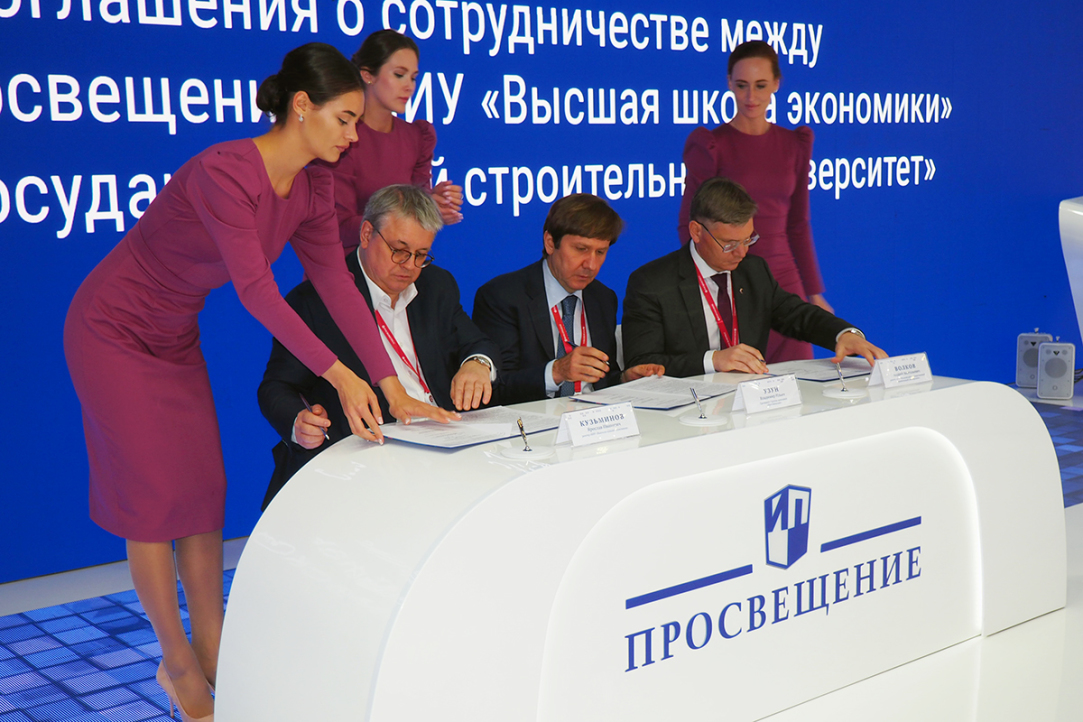HSE, MGSU and Prosveshcheniye to Develop New Schools Together

On May 24, at the St. Petersburg International Economic Forum, top executives from HSE, the Moscow State University of Civil Engineering (MGSU), and Prosveshcheniye Education Holding signed a cooperation agreement. As part of it, the two national research universities and Russia’s largest manufacturer of teaching and learning aids and services will suggest optimal spatial solutions for school buildings.
Many new schools are built in Russia every year, and the demand for large buildings has been growing recently, but the main thing in school design and engineering is not their size, emphasized HSE Rector Yaroslav Kuzminov. New forms of studies are evolving at modern schools, such as lectures, independent work and team projects, and each of these activities requires special spaces. ‘In some cases, this doesn’t mean we need to enlarge the building, but the space needs to be organized differently’, the HSE Rector said.
Existing school venues also need to be improved, Yaroslav Kuzminov emphasised. There are over 40,000 schools in the country, and they can’t all be demolished and replaced by new ones at once, which means they need to be renovated. But what should this renovation include? Merely painting walls light green, as in the past? The HSE Rector believes that schools should be renovated with recent design methods; old venues should be adjusted to the new requirements, and this won’t be too expensive. These renewed spaces will help refresh teaching methods, and the tasks of such schools won’t be limited to ‘uploading existing knowledge in the kids’ brains’ and behavior control, which makes sure the children ‘walk in pairs along wide corridors’.
‘The school projects should be developed jointly by spatial designers, curriculum designers, and suppliers of educational aids, including digital aids and simulators. This is why we signed the trilateral agreement between HSE, MGSU, and Prosveshcheniye’, the HSE Rector said.
MGSU Rector Andrey Volkov also believes that today’s schoolchildren should learn in a new environment, different from that which the previous generations were used to. ‘This environment should be optimized and built with the use of new methods and educational products’, he said, ‘That’s why we are trying to design school buildings that comply not only with today’s, but with tomorrow’s requirements: they are mobile, transformable, and adjustable to new forms of teaching and learning’.
According to Vladimir Uzun, President of Prosveshcheniye Education Holding, investment in human capital start in schools and big educational centres.
‘The Higher School of Economics has done a lot to substantiate this investment, and MGSU designs contemporary schools’, he said, ‘Our country is huge, with Southern and Northern regions, industrial and agricultural, and we should take into account their specifics in each case. But all these designs should meet the requirements of the information and education environment, and the new challenges facing Russian education’.
See also:
From Total Control to Reasonable Supervision: How Parental Control Affects the Success of Older Secondary School Students
Children from families with high incomes and whose parents hold university degrees have a better chance of going to university. Parental involvement in the education process, however, does not have an impact on the decrease in equal access to higher education for students. This was the conclusion reached by experts from HSE University’s Center for Institutional Studies.
Families and Private Investors Ready to Invest in Education
Households and businesses in Russia are ready to invest in education, but this potential is not fully realized. The participants of the panel discussion ‘The Future of the Economy: Education as an Area of Investment’ that took place on May 25 at the St. Petersburg International Economic Forum discussed why this happens.
Yaroslav Kuzminov: ‘Russia is on the Threshold of a Revolution in Higher Education’
At a panel session ‘Plan of Action to Improve Higher Education in Russia’ at the St. Petersburg International Economic Forum, the heads of leading Russian universities, HSE Rector Yaroslav Kuzminov among them, and foreign experts discussed how to bring Russian universities to a new level.
Education in Figures: Pocket Data Book
The pocket data book contains main indicators characterizing trends in the development of preschool, general education, lower and secondary vocational education as well as higher and postgraduate professional education in the Russian Federation. It covers also key education indicators for the OECD countries.


